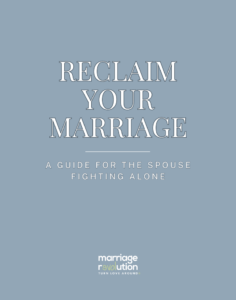One of God’s goals for your marriage is for you and your spouse to be better together than you were apart. God makes you better together by weaving you together and making the two of you one flesh. But becoming one flesh is complex because God joined you with someone very different than you. How do you become one flesh with someone completely different than you? How do you enjoy each other’s differences so that you can have a happy and healthy marriage?
“A great marriage is not when the perfect couple comes together. It is when an imperfect couple learns to enjoy their differences.”
Dave Muerer
Look at this short passage in Genesis 2:24 that explains God’s process for accomplishing this:
“Therefore shall a man leave his father and his mother, and shall cleave unto his wife:
and they shall be one flesh.”
This passage from Genesis gives you three crucial components to becoming better together. God desires you to LEAVE your father and mother, CLEAVE to your spouse, and WEAVE together to become one flesh.
Leave Your Parents
Leaving is the start of this process of becoming one flesh. Why? You can only cleave and successfully weave to the degree you leave. Unhealthy attachments to your parents (and other friendships and family members) will prevent you from completely cleaving to your spouse. Marriage is the only relationship God designed where two people become one flesh, and it should be your highest priority relationship on the planet.
Leaving doesn’t look like ignoring your parents; it looks like keeping that relationship as the proper priority. You shouldn’t kick your parents to the curb. You shouldn’t ignore them. You shouldn’t exclude them from family activities. You should talk to them regularly, get together with them, and express honor to them. But they shouldn’t be the primary relationship in your life. That position is reserved for your spouse. Leaving should be done in a way that shows priority to the marriage relationship and honor to the parental relationship. The goal is to leave and honor your parents simultaneously.
Cleave To Your Spouse
As you let go of your parents with both hands (leave), you can take your spouse firmly by both hands (cleave). The expression of cleaving is a never-ending commitment to each other. Cleaving equals commitment.
Commitment comes from seeing your marriage as a covenant vs. a contract. It comes from recognizing and believing, “…what God joins together, let no man separate” (Mark 10:9). It comes from seeing your spouse as God’s perfect gift for you to sacrificially care for, love, and accept regardless of what the future holds.
Weave Together (Become One Flesh)
As you leave your parents and cleave to your spouse, you are primed to weave your lives together successfully and become one flesh.
Weaving is the ongoing integration of 2 completely different people that creates an entity that is stronger, better, and more beautiful than apart. When you and your spouse weave well, you are better together…and continue to become even better together over time.
What makes weaving difficult are your differences. You and your spouse came into marriage with different backgrounds, experiences, habits, personalities, likes, preferences, communication styles, families, responses to conflict, etc… Without embracing God’s purpose and plan for your marriage, this is a recipe for your marriage to be a disaster. But, as you understand part of God’s purpose for your marriage (becoming one flesh) and follow his plan for your marriage (leave, cleave, and weave), God can merge you and your spouse together so that you’re better together than apart.
The key to weaving well or becoming one flesh is acknowledging, accepting, appreciating, and adjusting to your spouse’s differences.
ACKNOWLEDGE – Do you hurl or hide in conflict? Do you “enjoy the ride,” or do you like to “land the plane” in communication? Are you always looking for a party or a corner of the house to retreat to? What about differences in personality, parenting, preferences, past experiences, spending habits, food, decision-making, etc…?
If you haven’t already, sit down with your spouse and lovingly discuss how you differ.
ACCEPT—After you acknowledge how you are different from each other, God wants you to believe that the way he created you isn’t better than the way He made your spouse. And God wants you to know that the way he created your spouse isn’t better than how he created you!
Is it better to flee or fight in response to conflict? Are extroverts better than introverts? Both of these tendencies have positive and negative qualities. One isn’t necessarily better or worse; they are just different.
Your goal isn’t to conform your spouse to your likeness or to be more like your spouse. Your goal is to accept that God created you and your spouse uniquely and to accept your spouse and their differences completely.
Confess any ways you may have made your spouse feel inferior to you and commit to accepting their differences as just different, not wrong. Confess to God any way you have coveted your spouse’s character qualities. Commit to being a better version of the person God created you to be, and commit to helping your spouse do the same.
APPRECIATE – A step past accepting your spouse’s differences is to appreciate their differences.
Many of your differences from your spouse have positive and negative aspects. God brought you both together to help soften your weaknesses, improve your strengths, and balance some of your extremes.
A hurler needs a hider to help them understand the value of being quick to listen and slow to speak. A hider needs a hurler to help them know what it looks like to reconcile a conflict rather than sweep everything under the rug. An extrovert needs an introvert to help them appreciate the value of solitude and downtime. Introverts need an extrovert to help them understand the value of community.
From your list of differences above, list your tendencies’ positive and negative qualities and share them with your spouse. As your spouse shares their list and positive/negative qualities, affirm the positive and encourage growth in the negative…all with a spirit of acceptance.
ADAPT—Acknowledging, accepting, and appreciating each other’s differences lay a foundation for weaving successfully, but this next step is where the rubber really meets the road. Understanding and appreciating differences doesn’t equal weaving, but adapting to each other’s differences and preferences does.
An extrovert will stay home on a Friday night to honor their spouse. An introvert will go to a party to serve their spouse. A hurler will slow their conversation to what seems like a crawl to give their spouse time to process, think, and respond.
Successful weaving (becoming one flesh) requires a husband and wife to willingly and sacrificially change their natural behavior/tendencies for the good of one another and the overall intimacy of the relationship.
Becoming One Flesh Is an event and a process
In a sense, you and your spouse already became one flesh instantaneously on your wedding day (spiritually speaking). But the working out of becoming one flesh (physically and emotionally) is a process to be pursued for a lifetime.
Remember, becoming one flesh doesn’t look like becoming the same. Becoming one flesh looks like embracing each other’s differences, filling in the gaps of your spouse’s weaknesses, and leaning into each other’s strengths. As you acknowledge, accept, appreciate, and adapt to each other’s differences, you’ll better understand God’s design for your marriage. You’ll also experience a growing love and intimacy that will last a lifetime.

Hans co-founded Marriage Revolution with his wife, Star, in 2010. He counsels couples in The Woodlands, TX, speaks at marriage conferences around the country, and provides leadership and direction to Marriage Revolution.









